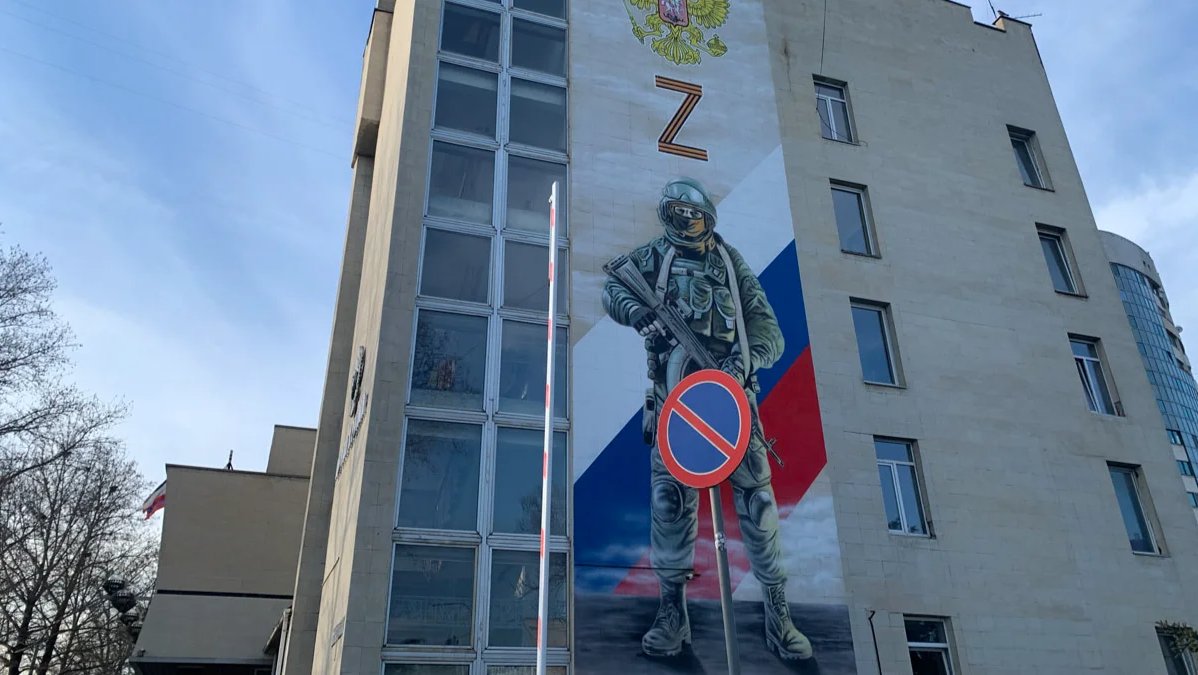This report was originally published on the website of Novaya Gazeta. We thank our colleagues for the opportunity to publish its translation with minor cuts.
Others people’s kids
Ekrem Tairov was mobilised to serve in the Russian army in October 2022. The draft office allegedly hinted that there are two options: frontline or prison. Ekaterina, his wife, at the time was pregnant with their third child which prompted the authorities to even withdraw the draft notice at the beginning of the “partial mobilisation” — so that he could bring up his many kids. They changed their minds later, however.
“When he was told in September that he could return home, we were all very happy,” Ekaterina recalls. “Ekrem was not champing at the bit to fight in the special military operation. We hoped to have another child for four years. And then I finally got pregnant when suddenly the [partial] mobilisation was announced…”
According to the woman, the events rapidly unfolded after her husband received his second draft notice on 13 October:
“My husband was hauled away the next day after the medical exam. I complained to the prosecutor’s office, travelled to the military base in Sevastopol where he was housed. I wrote to Crimea’s head [Sergey] Aksyonov. But I was rejected everywhere: I was told that we don’t have three kids, that I was only pregnant with the third, and that didn’t count. Meanwhile, Ekrem at the time was practically the only breadwinner in the family: I took my maternity leave.”
Tairov and his wife worked in a psychiatric facility in Crimea’s Bilohirsk (Belogorsk in Russian): he was a security guard, she was a nurse. This is where they met each other. Ekrem was still in Crimea until January for training and then he was sent to the frontlines.
“He is guarding the new territories,” Ekaterina says. “I don’t know which frontline he is stationed at. He rarely calls and only says that it’s not good there. I press on with my attempts to bring him back:
I recently submitted a new appeal to the draft office where I noted that there is a statement issued by the General Staff that fathers of three children are eligible for military service deferment. They very reluctantly accepted my appeal…”
Nevertheless, soon after Ekaterina once again demanded that her husband be returned home, member of Russia’s lower house of parliament Nina Ostanina said
that the statement about deferments for fathers of three children is only a recommendation: the draft officer is in charge of these fathers’ fate.
“It feels like nobody cares,” Ekaterina says. “Every day I get more and more convinced that everyone fends for themselves in this country. Nobody cares about other people’s kids.”
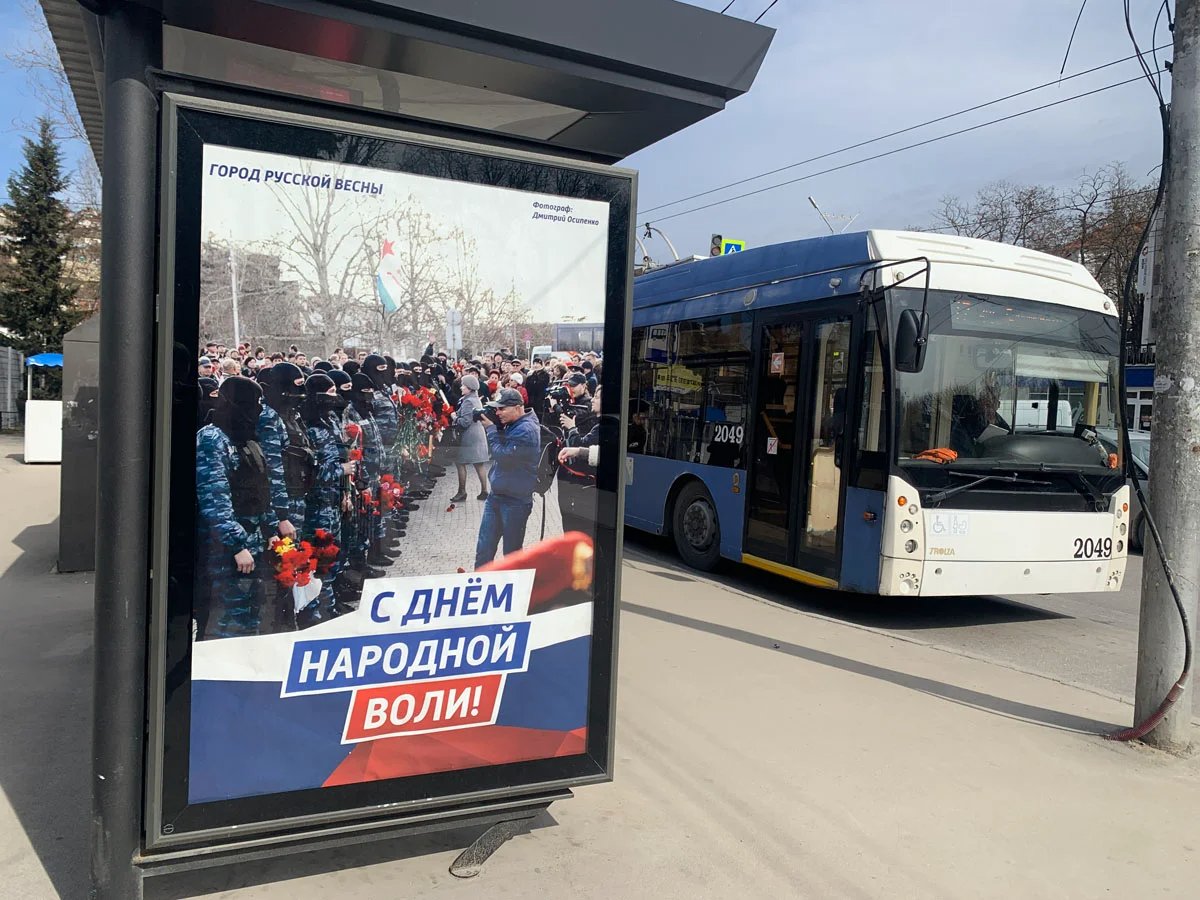
“Happy People’s Will Day!” Sevastopol. Photo: Ivan Zhilin / Novaya Gazeta
‘Not our special operation’
The situation in Crimea had become rather anxiety-inducing by the ninth year of Russia’s presence there. The idyllic scenes of the “Crimean Spring” quickly turned obsolete after local “revolutionaries” were removed from decision-making processes and mainland Russian officials arrived in hordes. Along with forcible business takeovers conducted in cooperation with the Crimean self-defence forces and reallocation of land plots. However, the peninsula was still developing before 2022, Russia was pumping funds into Crimea and it was visible — buildings and railway stations were under construction along with a new airport in Simferopol, new schools and preschools. The Crimean Bridge, too.
However, it all seemingly lost its value last year. At first, armoured vehicle columns stretched across the bridge, then injured and dead soldiers started going in the opposite direction, while drones ultimately reached the peninsula: drones that sometimes managed to blow something up. Locals quickly learnt to distinguish between the sound of missiles being launched and missiles striking the area. Funerals of those who joined the special military operation became a regular thing. Civilians were then sent off to the frontlines within the partial mobilisation. Official reports suggest that around 2,000 were drafted in Crimea and Sevastopol. And a significant part of them, if not a majority, are Ukrainian citizens.
After the “Crimean Spring” nobody instructed Crimeans to hand in their Ukrainian passports, so people held on to it. Many of them out of principle.
Primarily, those were Crimean Tatars and Ukrainians who mostly rejected Russia’s takeover of the region.
On 26 February 2014, clashes between supporters of Russia and Ukraine broke out near the Crimean parliament building. Around 6,000 people on each side. The backbone of the Ukrainian group was Crimean Tatars who still, after decades, remember Joseph Stalin’s 1944 deportation decisions when the whole ethnic group was forcibly relocated from the peninsula to Central Asia, Siberia, and the Urals. They could not accept Russia’s arrival, the country being the Soviet Union’s successor.
The parliament clash brought forward repressions for the Crimean Tatars: Crimean Solidarity human rights activists keep count of political prisoners in the region. According to their data, 116 people out of 181 in total are Crimean Tatars.
They are persecuted for “wrong” talks in mosques, alleged terrorism (even though detainees under these charges had no arms or explosives in their possession), “plotting sabotages”, even the rally in front of the Crimean parliament. Ukrainians are also targeted in a similar way.
In the nine years since Russia annexed the peninsula, Crimea has become a leader among Russian regions in terms of the number of politically-motivated criminal cases, overtaking North Caucasus regions.
However, the “partial mobilisation” also applied to the Crimeans who never wanted to live in Russia: Crimean Tatars and Ukrainians began receiving draft notes as well.
“We learnt about the [partial] mobilisation at the same time as everyone else, 21 September. Draft notes were already actively distributed on 22 September, people were notified through every means possible, particularly over the phone. All the mobilised people were ordered to assemble at rally points on 23 September,” human rights activist Abdureshit Jepparov recalls.
“Then, on 23 September, I personally went to the draft office in Belogorsk and this is what I saw. It was 6 AM but there were already people there. A lot of people: those who were saying goodbye and departing. There was talk that there should have been around 300 draftees but in reality, just over 200 people showed up. Crimean Tatars were not a majority. Yes, our people are very close-knit, each person is seen off by the whole family and all their friends. Therefore, there were more Crimean Tatars near the draft office but Russians were the majority among the draftees.”
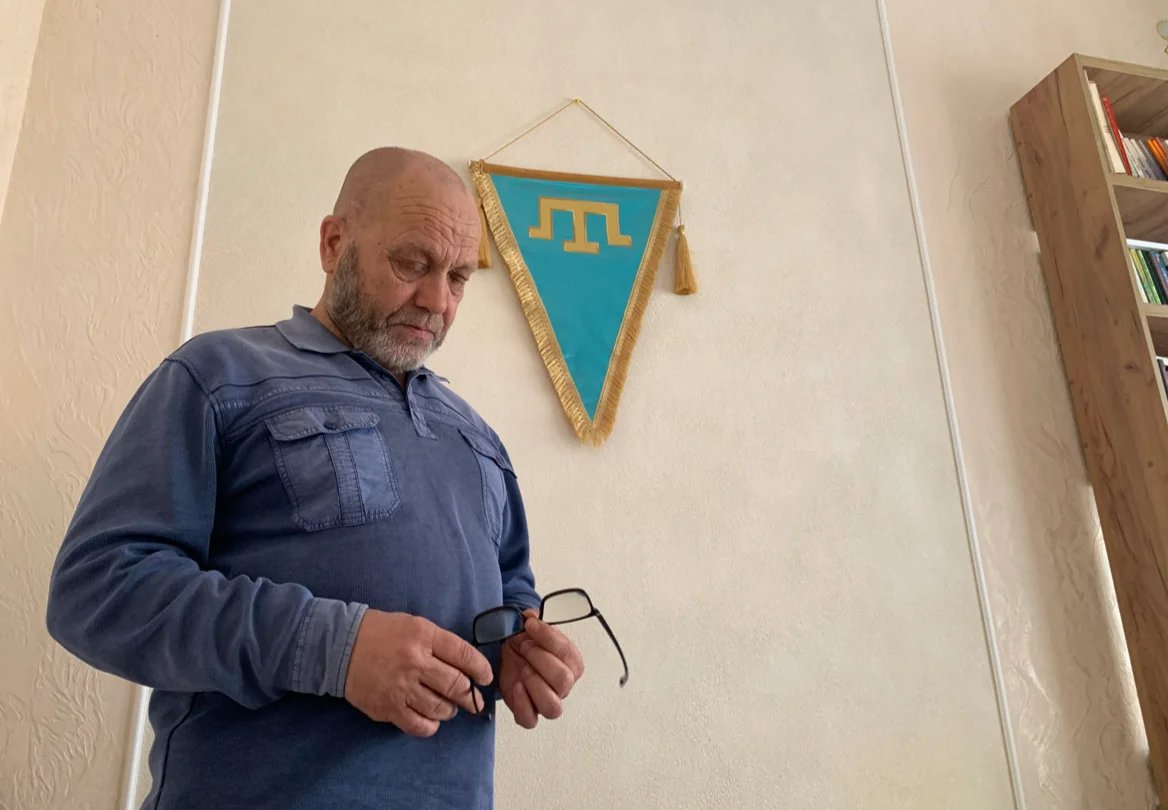
Human rights activist Abdureshit Jepparov. Photo: Ivan Zhilin / Novaya Gazeta
Jepparov notes that in the first few days, information was coming as a constant stream and could not always be verified.
“As a human rights activist, I did commit the sin of not always posting verified information, it was not possible to fact-check it. It was like a wall of information, it was an emotional time. We were also honestly panicking.”
Lutfie Zudieva, human rights activist with Crimean Solidarity, has a different opinion on the Crimean Tatar mobilisation.
“The reports that 80-90% of the draft notices were sent specifically to Crimeans Tatars are only true for specific towns and villages, it is not the reality in cities like Dzhankoy or Sevastopol, for example. Because if you arrive in a Crimean Tatar village, it is clear that most draft notices will be for Crimean Tatars. The cities where there are fewer Crimean Tatars will have fewer notices for them. According to my observations, it was done proportionally to the general population shares.
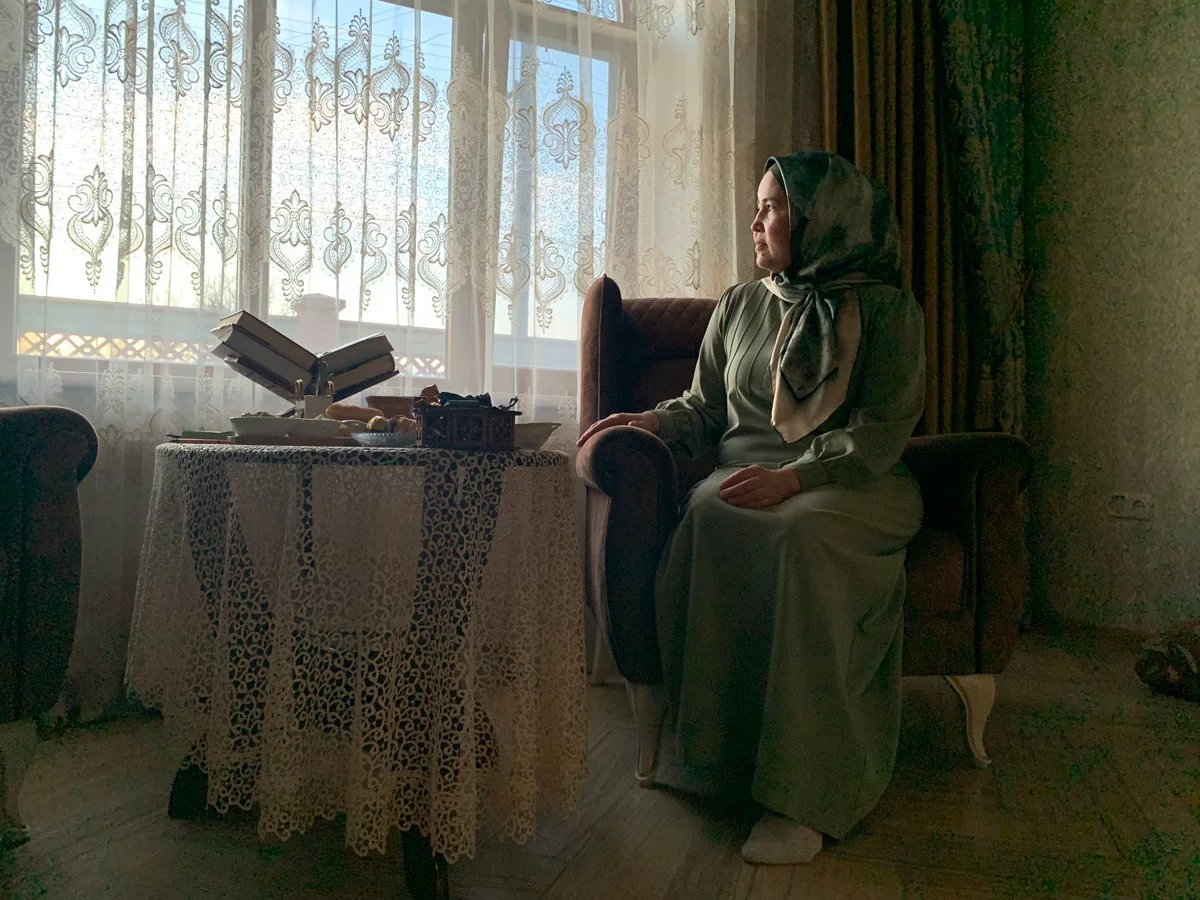
Lutfie Zudieva, human rights activist with the Crimean Solidarity. Photo: Ivan Zhilin / Novaya Gazeta
At the same time, both Zudieva and Jepparov note that the Crimean Tatar community is hit hard by each mobilised man from their ranks.
“Even though we say that not many of our men have been drafted, the Crimean Tatars are not a very populous group. Even if you take 200-300 men, we feel it. Moreover, because it is not our special operation,” Jepparov concludes.
‘Why would I shoot?’
Not all of those mobilised left the enlistment office in Bilohirsk on 23 September. People were taken from the city over several days and in several stages: in groups of 44 people — the number that fit into the two vans assigned to Bilohirsk.
Many, according to Jepparov, did not arrive at the assembly point for partial mobilisation at all.
“Those who were absent were then replaced by volunteers. I saw these guys too: they were cheerful when they were leaving. They were people from remote villages with no prospects,” says the human rights activist. “And those who didn’t come, as it turned out, had left Crimea. On 21-23 September a lot of people left Crimea.”
They left in a panic, even those who were not threatened by the draft: people with diabetes, fathers with many children: some had four or five children… Whole families fled. Mostly to Georgia and Kazakhstan.
Edem Beyaz (his real name was changed) also left Crimea in the early hours of 23 September. He said his goodbyes to the parents and left the house where he had lived for 23 years.
“My parents supported my decision. We all remember how our grandfathers were seeking the right to return to Crimea, and my father said: ‘Apparently, you’ll have to go through that, too.’ He said Crimea is small, and there’s nowhere to hide, so it’s better to go abroad, and if they don’t let you out, at least go deep into Russia. My father himself was born in Kazakhstan, near Ust-Kamenogorsk. And I’m in that city now.”
Edem said that they brought a draft notice to his house on 22 September.
Edem was supposed to come to the enlistment office the next day, but it was decided at home that it wasn’t going to happen. It took three hours to pack, he was leaving Crimea with a friend who decided not to wait for his notice to arrive.
They went to the Kerch train station by car and from there they boarded trains to reach Krasnodar. They spent two days taking buses and hitchhiking from Krasnodar to Astrakhan. From there they took a train to Atyrau, Kazakhstan.
Support independent journalism
“When border guards entered the car, I thought, ‘Now it’s all over’. After all, this is the FSB, and they should be tracking certain people. But no, they just looked at my passport for a minute and asked about the purpose of going to Kazakhstan. I said: ‘I am a businessman and I need a foreign bank card’. And they stamped my passport — I was free to go. The border guards on the Kazakh side were very sympathetic: ‘We will let everyone through, don’t worry’.”
Edem, like Abdureshit Jepparov, says that what is happening is “not (…) [concerning] the Crimean Tatar people”.
“My family are not political activists. And yet we understand what Russia is. This is a brutal state. We have seen this over the past nine years.”
“I didn’t even serve in the army, and they were ready to take me away. What would I have done there? I probably would have killed myself. Ukrainian guys didn’t do anything to me, why would I shoot at them?”
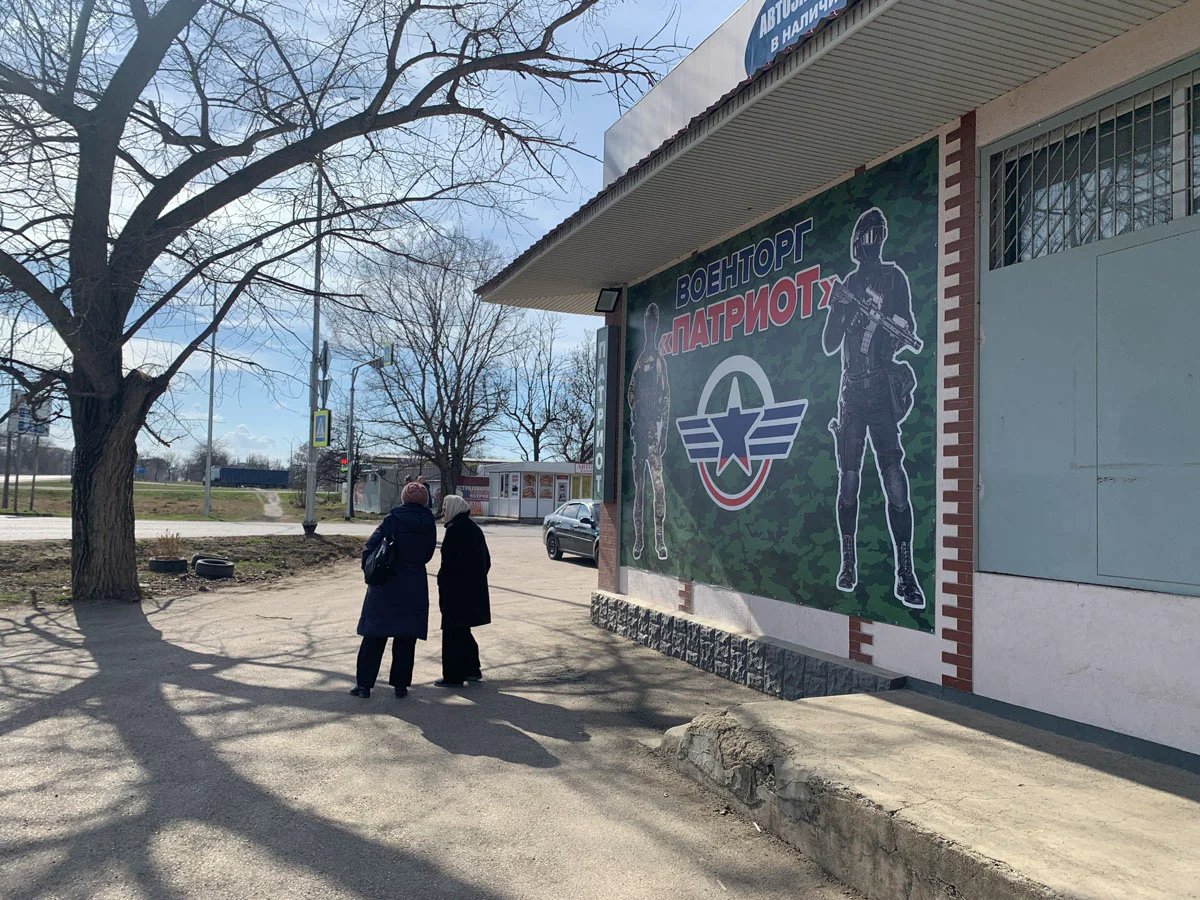
Dzhankoy. Photo: Ivan Zhilin / Novaya Gazeta
Secret wakes
Of course, not everyone left Crimea. Many Crimean Tatars were mobilised. But no one glorified them and what they did. Even their families speak about them with reluctance, in a whisper.
“They bury them quietly,” says Lutfie Zudieva. “Usually, there are a lot of people at the funerals of Crimean Tatars, but only close relatives come to the servicemen who died in Ukraine. The families themselves don’t call anyone…”
“I only know about two dead Crimean Tatars: they were from Bakhchisaray and Dzhankoy districts. The boy from Dzhankoy was not there by his own will. It turns out he was doing military service until last February. And just when it all started… They buried him quietly, too.”
Don’t step out
Life for Ukrainians in Crimea after the Russian annexation also became difficult. Especially because Ukrainians on the peninsula were not as united as Crimean Tatars. They were less politically active, and, therefore, fewer political criminal cases were brought against them in nine years than against Crimean Tatars.
But the offensive was launched on the cultural front: today there is not a single school in Crimea that teaches entirely in Ukrainian (there were seven before Russia seized the region), and the Ukrainian Orthodox Church of the Kyiv Patriarchate had its church in Simferopol taken away. Even the children’s theatre studio called Svitanok, where performances were staged in Ukrainian, was shut down. Officials saw the studio’s work as “propaganda of alien Western values” because of the play entitled Amazon Song: one of the girls performed in it with a crown on her head, which they saw as a reference to the Statue of Liberty.
Members of the Ukrainian cultural centre who were promoting the Ukrainian languages and culture were harassed and hounded by searches and administrative prosecution. Somebody wrote “Attention, a fascist lives in your building” on the door of Leonid Kuzmin, head of the centre. The centre activists ultimately were forced to leave the region.
However, Russian draft officers did not miss the opportunity to enlist Ukrainians still living in Crimea to make them fight for Russia.
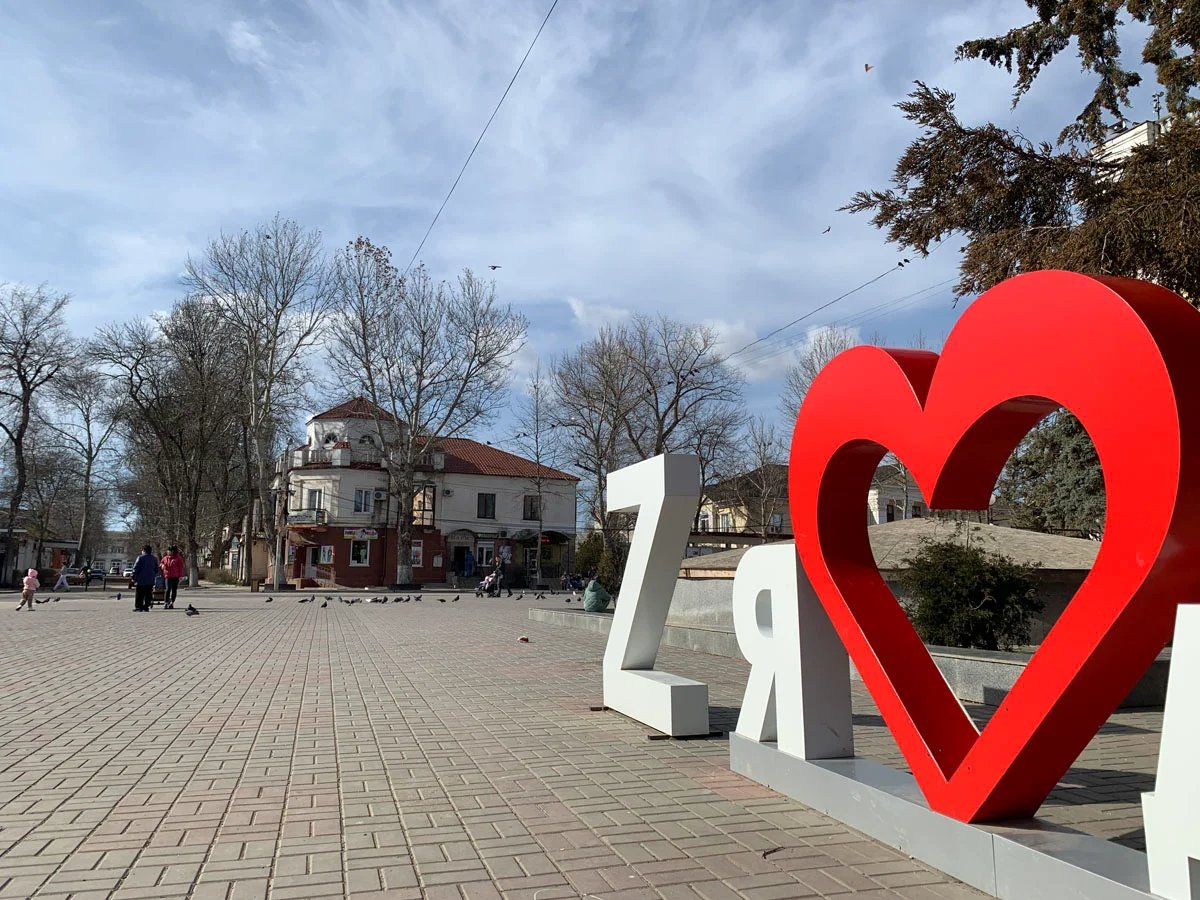
Part of an art object in Dzhankoy, Crimea. Photo: Ivan Zhilin / Novaya Gazeta
“The fact that [partial] mobilisation would be announced became clear the day before, on 20 September. Then in the evening the media started announcing Putin’s address, while simultaneously wondering: ‘Will he announce the mobilisation?’ I began to ponder what to do if they come for me? I no longer had time to leave the country: it would be a day’s journey to the border with Kazakhstan. So I decided that I would stay at home, but in the beginning I wouldn’t go out anywhere,” says Kerch resident Serhiy Polyashko (the official name was changed). “I bought tinned food and grains to last me a month. And I did get a notice, it happened on the evening of 21 September. They knocked on the door, I didn’t open it. I pretended I wasn’t home. They waited for about five minutes, and then taped it to the door. But I learnt about this only two weeks later, when it became clear that it was possible to avoid [partial] mobilisation and that they let you go if you resisted. On 4 October I decided to leave home for the first time, and found out that I was required to go to the draft office on 22 September. Then I didn’t hide anymore, I lived a normal life.”
Serhiy says he does not hate Russia, but he is not ready to die for it either.
“I’m Ukrainian. And even though all my relatives are in Crimea, I’m horrified (…) [by all this]. I think that everything that has happened since 2014 is a big mistake and too many lives have been sacrificed for it. But my life will not be another one on the sacrificial altar.”
Reasons of conscience
One of the people I spoke to dropped this phrase: “In Crimea, they took away those who wanted to go”. Although this is not true, the feeling that the majority of Crimeans who did not want to go to the frontlines avoided mobilisation is still strong. Some left, some hid.
“Crimea was deserted. I went to Simferopol in those first days, and it was obvious that the people around were women, girls, elderly men, and teenagers. The conscripted male population was pretty much absent,” says Abdureshit Jepparov.
Emil Kurbedinov, a Crimean lawyer, has similar observations.
“There are a lot of Crimean Tatars in the area where I live. It’s a very lively neighbourhood. But when the mobilisation started, it turned into a wasteland: the stores were closed, you couldn’t see any men. When I took my son to school, the kids who used to come with their dads then came with their moms. Some went away, others just holed up in their homes.”
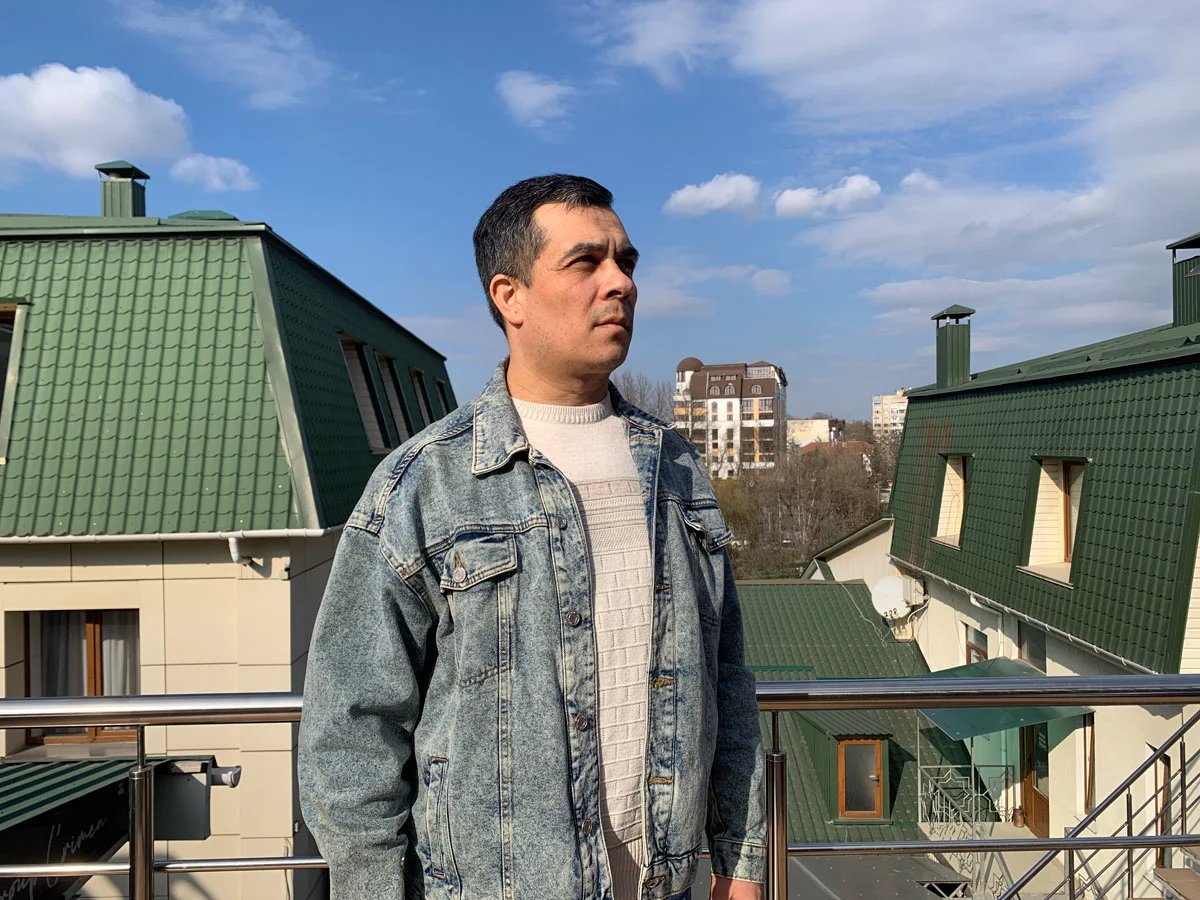
Lawyer Emil Kurbedinov. Photo: Ivan Zhilin / Novaya Gazeta
Kuberdinov and his colleagues were faced with a storm of calls from the men desperate to learn how to avoid going to war.
“Out of ten men, nine were Crimean Tatars, probably. They were asking about legal grounds of enlistment and avoiding it. Some said that they received notices but they had three kids, some had disabilities, some were over 60 years old. We told them about the legal grounds and what they should do according to the letter of law. In fact, many of the people who called us told draft offices that they were still Ukrainian citizens and never renounced this passport. Therefore, legally they could not go to the war. Of course, there were those who said they could not fight or hold arms even due to their religious beliefs. Some had it all: citizenship, religious beliefs, and reasons of conscience. There was even a young guy who served in Sevastopol when the mobilisation began. He was a regular conscript, a Crimean Tatar, he was sent towards the frontlines: Chonhar, the Crimean border. His mother came to us, we sent an enormous number of complaints and he was returned back to Sevastopol. So everyone who called us was not enlisted.”
According to the lawyer, those who did not have any grounds or opportunities to evade the draft were mostly enlisted.
“Most of the people who went there already had a contract when the mobilisation began, like serving in the Ministry of Emergencies. I saw biographies of the people who died there: they were serving in the Russian army since 2014 or 2016 on contracts. Well, they did go…”
It is impossible to verify how many Crimeans died in the “special military operation” in Ukraine.
Join us in rebuilding Novaya Gazeta Europe
The Russian government has banned independent media. We were forced to leave our country in order to keep doing our job, telling our readers about what is going on Russia, Ukraine and Europe.
We will continue fighting against warfare and dictatorship. We believe that freedom of speech is the most efficient antidote against tyranny. Support us financially to help us fight for peace and freedom.
By clicking the Support button, you agree to the processing of your personal data.
To cancel a regular donation, please write to [email protected]
